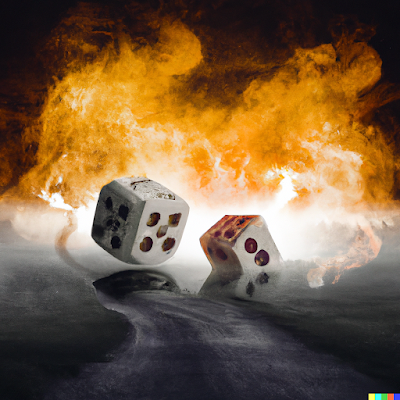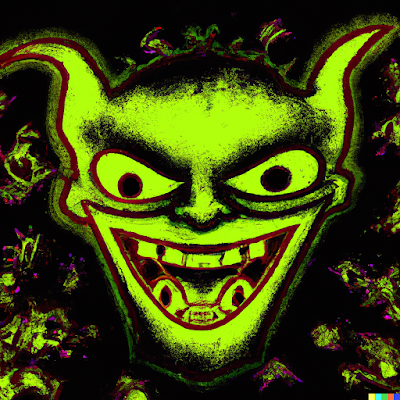Last week: Seven Very Boring Cultist Hooks
In low-level adventures, bandits are probably even more common than cultists. Little thought is typically given to who these people are or why they're doing what they're doing. Well, I've given it some thought. I've given it a lot of thought.
What the wide-eyed idiots in the villages are saying. The bandits’ reply.
- Freebooters are picking the lord’s land clean! I guess word hasn’t reached you provincials yet. The local lord ceded this land to me in the last witan, and I’m going to strip it and flip it. Hey, interested in a fiefdom? Want to marry one of my deadbeat sons?
- Bandits are setting fire to the orchards! We’re not bandits. We’re a grove of druids conducting controlled burns to promote healthy growth. they glower pastorally at the PCs
- Outlaws stole all of our precious tchotchkes and threw them in the river! OK, we did do that. We’re obsessive thrill-seekers and we think we may have a problem. We definitely have a problem. We need help. Could you please help us?
- The pillagers are going door to door and shaking down ordinary citizens! I am sorry that you seem to be confused. We are duly deputized tax officials, and this entire region is in arrears. If you don’t like our collection techniques, take it up with your absentee baron.
- The brigands sadistically force their captives to dance for their amusement! You’re misinformed! We’re not (just) brigands, but also cultural envoys! We’ll release anyone who can teach us a unique dance from their homeland. [convincing fabricated ones will work too]
- Foreign raiders have disrupted the peaceful tranquility of our villages! What!? We're refugees from a war these people started. They owe us. We have hungry (and heavily armed) families to feed!
- The manor lord pays ~GOOD COIN~ to check his snares for captured bandits. Please, I’m not a bandit. We are poachers on this land because the manors are a terrible waste of useful land for the amusement of an ennobled few.
- The bandits are robbing merchants along the old trade road. Bandits? Hardly. It’s not about money, it’s about sending a message. We’re destroying what we steal to bring down the entire organized economy!
- Hijackers have stolen the fall livestock herds, we have no beef! We’re not bandits. We’ve simply freed these noble animals from your carnivorous tyranny. Try some BEANS instead. *”bandit” brandishes fistful of beans*
- Now the bandits have captured the spring chicken wagons, we have no eggsssssss! Look, the chickens in this region are an intrusive breed from across the sea; escaped individuals are interbreeding with cockatrices in the hills. Isn’t giving up omelets for a few years worth it if it prevents a demon chicken from turning your gnome illusionist into a garden gnome?
- Nefarious criminals are in the employ of the OLDE DRAGON in the mountain. “Employ”? Hah, we wish. We dump treasure in her lair once a year, and in return, she doesn’t raze the countryside. We take a very small commission for this invaluable service!
- Small bands of desperados have picked the land clean of anything useful! Uh, we’re foraging parties ranging out in advance of a massive army. You should be evacuating. Like yesterday.
- The outlaws are breaking into houses and going through our things, but they don’t take anything? I’m so confused? We’re concerned members of the community who are taking a proactive approach to crime by judiciously investigating residences for signs of imminent criminal activity. Obviously no one likes dealing with a break-in, but in the long term, this prevents much worse crime!
- Bandits have broken into the medical college and stolen all the preserved braaainsss! Hi, really sorry about this, but we are escaped prisoners from a mindflayer experiment. They put kleptophores inside our heads, and now we absolutely cannot stop stealing things. they wiggle with wormy energy while waiting for the PCs to reply
- Robbers are working their way through the area to shake down anyone who has more than two coins to rub together. We’re actually reappropriating resources to the most needy in society. Hey, you have some nice gear. How about we discuss a nonviolent reappropriation plan, for the good of the community?
- Bandits are camped outside our town, threatening our way of life! Actually the town promised to pay us for protection services and now is trying to renege on the deal.
- Our bucolic paradise has been disturbed by bandits who steal with stylish flair! Excuse us for trying to inject a little culture into this backwater with our interactive theater presentation of the Highwayman’s Daughter. These rubes just don’t appreciate art!
- Horrible terrible no-good footpads broke into our homes and stole our furniture… waaah! I know it looks weird, but the flow of cosmic energy within this area is way out of whack. Rearranging all the home furnishings in a 10-mile radius will bring wealth, happiness, and long life to everyone.
- Bandits are everywhere! Bro, look around. This world is a kleptocracy. Didn’t you steal that magic sword out of some ancient tomb?
- Roving vagabonds speaking the DEVIL’S TONGUE menace our homeland! [In the language of a far-off land] Actually we’re just really, really lost.







